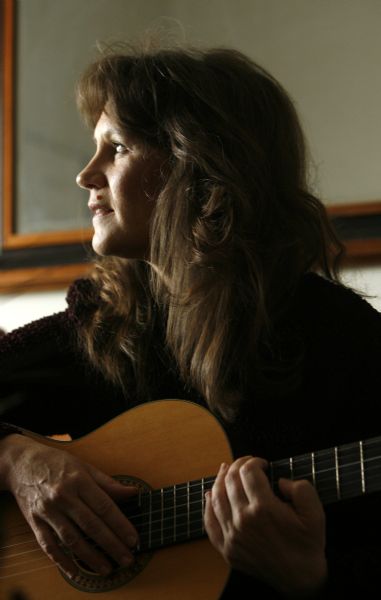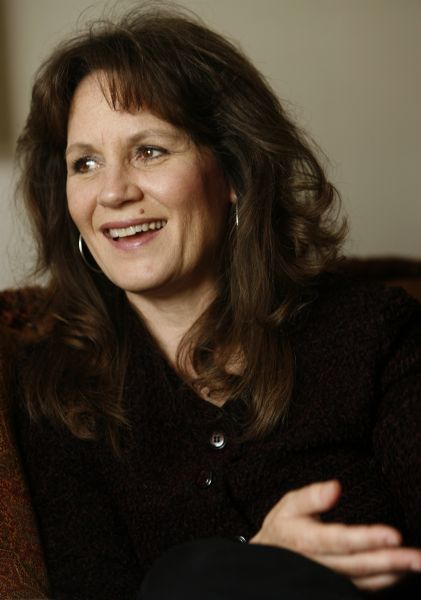This is an archived article that was published on sltrib.com in 2010, and information in the article may be outdated. It is provided only for personal research purposes and may not be reprinted.
Logan » At age 51, Kim Rives has the look of a poised public speaker and entertainer: long dark hair, kind brown eyes, confidence as she cradles her guitar.
Yet it's her story, not just her polish, that captivates audiences throughout Utah and the West who invite Rives for seminars and to talk about her book, My Walk Thru Heaven .
Not only does she tell them a harrowing tale of suffering and a surprising visit to heaven, she teaches that, ultimately, three things matter: that people love, forgive and serve one another.
"If we did that, we would have a harmonious world," says Rives, who lives alone in her Logan home 13 years after being diagnosed with advanced breast cancer.
A bone-marrow transplant -- the first paid by the reluctant agency controlling Utah Medicaid funds after Utah Legal Services took it to court -- saved her life.
Although it's not a description Rives would apply to herself, she is a Mormon mystic. She says she sometimes is visited by long-dead ancestors and has felt the comfort of her son, Dustin Rives, who died two years ago at age 21 after an allergic reaction to headache medication.
And daily, she says, she literally hears a voice, which she perceives to be the Holy Spirit, guiding her toward greater charity and forgiveness.
"Every time I pray, he speaks to me very clear," Rives says. "I understand that is a bit unique."
Her older sister, Sandy Krambule, who lives down the street, says Rives' suffering clearly led her to greater spiritual maturity.
"Sometimes the depth of our hell," Krambule says, "becomes the height of our heaven."
Body and spirit
Rives' intense suffering began in 1997, when she was diagnosed with breast cancer. But even before that, she had hardship as well as spiritual compensation.
Born in Downey, Idaho, she was reared with eight brothers and sisters on a 3,500-acre wheat farm near Dillon, Mont.
The family was poor. At one point, her father required Rives and a sister to spend a summer in a basement home that he had turned into a pigsty. They slept on a mattress surrounded by piglets and manure, conditions Rives later learned allowed parasites into her bloodstream.
She says she witnessed her first miracle as a child, when her father required the family to fast from food and water for three days because of a drought afflicting the parched patchwork of land that comprised the farm. They were up on a hillside, holding hands and praying, when a rain cloud moved against the wind and deluged their fields, says Rives and her Logan mother, Chelsea Athel Mounteer.
Another time, a teenaged Rives was driving a tractor in the dusk through a field when the machine's lights failed. Making her way back down the hill in the dark, a voice suddenly commanded her to stop. The next day, she discovered the machine had been on the verge of a steep embankment.
"That's when I realized that if we listen," Rives says, "God can save us."
Noting her daughter's love of music, her mother bought her a guitar and arranged for music lessons. A stunned Rives won the local Junior Miss pageant during her senior year, singing and playing a love song she had written.
At Rexburg's Ricks College -- now Brigham Young University-Idaho -- Rives met her future husband, a returned Mormon missionary from a prosperous family. They married in an LDS temple, lived in Missouri while he attended chiropractic school and eventually ended up in Spokane, Wash.
Though Rives counts blessings from that union -- their three children, his role as a "good provider" and the freedom she had to perform music -- she says it was an abusive marriage.
Her husband left her for another woman, she says, and refused to support Rives and the children (then two teenage girls and her preteen son). In late 1996, they moved to Cache Valley, where her mother lived with her stepfather. Rives found part-time work as an aide and music therapist at Sunshine Terrace, a nursing home.
They had not been in Logan long when Rives was diagnosed with breast cancer. The lump was the size of an egg.
She refused traditional medicine, at first, and tried to cure it with diet and nutrition. When it was apparent her cancer was too advanced for holistic methods alone, Rives agreed to chemotherapy.
Weakened from the disease and treatment, she slept much of the time and no longer could work. She says her children, who feared their mother was dying and their dad didn't want them, began getting into trouble.
Eventually, they went to live with their father and, ultimately, the younger two ended up in foster care.
At one point before Rives' bone-marrow transplant, she was near death from viruses due to a weakened immune system. Lying on a rented hospital bed in her mother's second bedroom, she prayed for release from her pain.
God's answer to that prayer, she says, was a glimpse of heaven she never will forget.
Schooled in heaven
Rives, according to her own account, was led by a messenger through a beautiful, rose-studded meadow to a city -- bypassing two others -- that boasted streets of gold and diamond-studded buildings.
Inside a classroom, she says, she met her deceased grandmother, who was teaching other ancestors about genealogy. She also met Joseph Smith, founder of The Church of Jesus Christ of Latter-day Saints. He, too, was teaching a lesson.
Her twin sisters, who had died in infancy, were there, and she saw a vision of her premortal self learning to love music.
Rives says she was taught about forgiveness from her Mother in Heaven and shown orphans in the Third World whose personal lights beamed brighter as they received handcrafted clothing that Rives' own mother had made.
Jesus Christ, she says, showed her his crucifixion, which was more violent and painful than she ever had imagined. From the cross, she says, "he asked me to give him my pain." Jesus also showed her a vision of the basement pigsty and her young self, surrounded by demons that she later realized symbolized the anger, depression, fear and guilt in her life.
"He said, 'Kim, look to the light and live,' " she recalls. "As soon as I was willing to look at his light, they had to flee. I felt his power, strength and deliverance. ...
"He didn't point out my faults, my failings, my weaknesses. He just loved me. He's God, but here he is willing to serve me. I'm still humbled by that."
It became apparent during her trip through heaven that she was expected to return to her body.
She balked.
Finally, she was led to her sister's room in Logan, where Krambule was working on her master's thesis, aided by a "cute" male angel who could communicate by thought with Rives and whom her sister clearly could not see.
Rives watched as her sister answered a phone call from their mother, saying she had found Rives cold and lifeless.
"It was terrifying," Krambule says. "Mom was saying, 'She's gone. We've lost her.' "
She demanded their mother put the phone by Rives' ear. "I told her to come back," Krambule remembers.
Suddenly, Rives began talking to Krambule, in what she now believes was her "spirit voice," through the phone receiver.
Her mother, with Rives' body, saw and heard none of the conversation, but Rives assured Krambule she was in the room with her. She affirmed it by telling her what she and her little girls were doing, what they were wearing. She even told her about the cute angel helping write her master's thesis.
"It was a little bit of a head trip," Krambule remembers.
Krambule again told her sister to go back to her body.
The second Rives decided she should return, she was whisked through a tunnel, a portal back to earthly life.
Her mother noticed a finger twitch, and then Rives whispered that she was freezing. Her mother heaped blankets on her, and, in the coming months, the young woman would undergo the transplant and years of recovery.
When Rives talks of heaven these days, it's as if it's the neighboring town.
"Over there in heaven," Rives says, "time has no meaning."
Earth work
Rives -- who continued writing songs during her illness, many of them poking fun of her predicament -- produced a CD of spiritual music in 2003.
She began talking of her experience to church groups from many denominations as well as secular groups.
Two years ago, after a lot of urging by the Lord, she says, she published her book, My Walk Thru Heaven .
"I really felt I'd be struck by lightning if I didn't write it," she laughs.
The book has allowed her to help many people, Rives says, and provides her the money to live. She also is training to become a corporate motivational speaker.
Sometimes after a seminar or discussion, she will have 300 or 400 e-mail messages.
Many people have lost loved ones and want reassurance of an afterlife, she says. Others have their own near-death experiences to share.
"There are so many people out there ... who have fears," Rives says. "I've been able to be an instrument in the Lord's hands."
She straightens out people if they refer to her as psychic and refuses to seek answers for others from God. She suggests only that they pray.
The gift of frequent communication that God has given her, she says, is intended for her own spiritual growth.
Although her experience in heaven affirmed her testimony of the LDS Church, Rives says, she now knows that all religions strive to help people return to a higher state.
"What I realized in heaven is the Lord loves us all. We all make mistakes and are learning. He knows everyone's heart."
Mormon author tells of her trip to heaven
Author Kim Rives will discuss her near-death experience at Wednesday's monthly meeting of the Salt Lake City chapter of the International Association for Near-Death Studies.
The group meets from 7 to 9 p.m. every second Wednesday at the Salt Lake County Government Center, 2001 S. State St.
The free meetings attract 75 to 300 people of all ages and faiths.
For more information, visit www.kimrives.com or www.iands.org.







